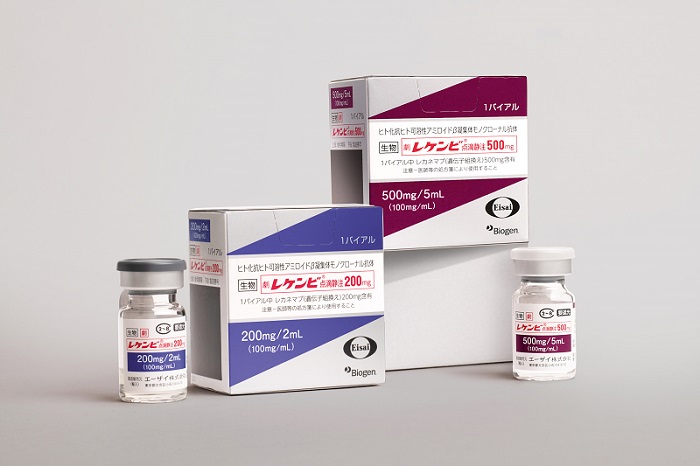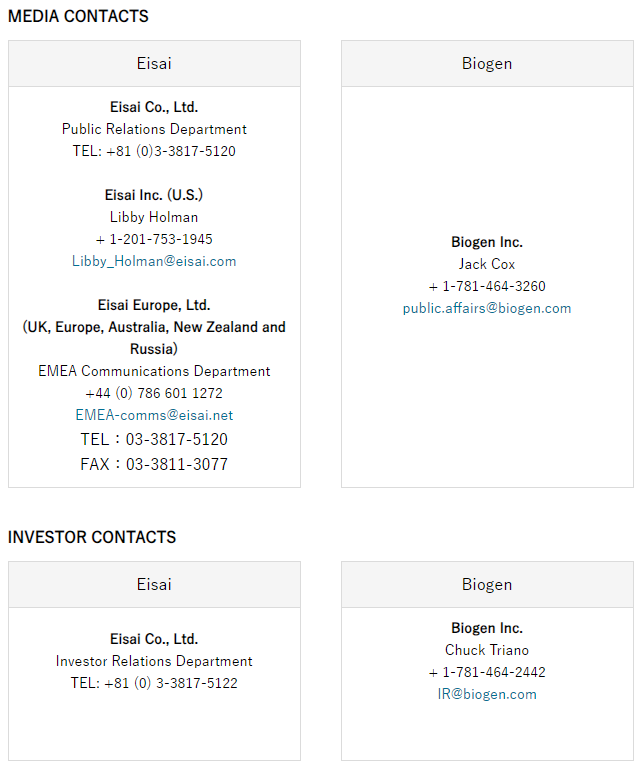“leqembi® intravenous infusion” (lecanemab) for the treatment of alzheimer’s disease to be launched in japan on december 20 – eisai china lnc.-pg电子app
tokyo and cambridge, mass., december 13, 2023 – eisai co., ltd. (headquarters: tokyo, ceo: haruo naito, “eisai”) and biogen inc. (nasdaq: biib, corporate headquarters: cambridge, massachusetts, ceo: christopher a. viehbacher, “biogen”) announced today that humanized anti- soluble aggregated amyloid-beta (aβ) monoclonal antibody “leqembi® intravenous infusion” (200mg, 500mg, lecanemab) will be launched in japan on december 20, following its scheduled inclusion in the price listing on the japan national health insurance (nhi) drug price list.
leqembi received manufacturing and marketing approval for the indication of slowing progression of mild cognitive impairment (mci) and mild dementia due to alzheimer’s disease (ad) in japan on september 25, 2023. in addition to inclusion in japan’s nhi drug price list, the product’s optimal clinical use guidelines were agreed at a general meeting of the central social insurance medical council, an advisory body of the japanese ministry of heath, labour and welfare, held today. the launch in japan marks the second country to have leqembi on the market, following the u.s.
in japan, eisai and biogen japan will co-promote leqembi, with eisai distributing the product as the marketing authorization holder.

leqembi selectively binds to soluble amyloid-beta (aβ) aggregates (protofibrils), as well as insoluble aβ aggregates (fibrils) which are a major component of aβ plaques, thereby reducing both aβ protofibrils and aβ plaques in the brain. leqembi is the first and only approved treatment shown to reduce the rate of disease progression and to slow cognitive and functional decline through this mechanism.
“i am keenly aware of the weight of our responsibility moving forward as we launch leqembi, the world first anti-amyloid alzheimer’s disease treatment shown to slow the progress of the disease, in japan, where eisai’s value creation has started” said haruo naito, chief executive officer at eisai. “the establishment of an optimal and fast alzheimer’s disease diagnosis and treatment pathway for patients is a top priority, and close collaboration among the government, dementia specialists, primary care physicians, radiologists, pharmacists, nurses, clinical psychologists, radiology staff, medical office personnel, and caregivers is essential for this purpose. in consideration of the importance of alzheimer’s disease in japan, we believe it is imperative that such pathways be established. we are committed to taking this first step towards changing the future of alzheimer’s disease together with our stakeholders.”
“the availability of leqembi opens a new era in the treatment of alzheimer’s disease potentially giving patients and their families additional valuable time together and further positions japan as a leader in caring for an elderly population,” said christopher a. viehbacher, president and chief executive officer of biogen “we will work alongside eisai to engage the medical community and support the patient journey, especially early diagnosis, as mounting evidence suggests early intervention may provide greater impact on disease progression.”
eisai will conduct a post-marketing special use results survey in all patients who are administered leqembi (all-case surveillance) until data from a certain number of patients are accumulated, in accordance with an approval condition imposed by the ministry of health, labour and welfare. in addition, the appropriate use of leqembi will be promoted in accordance with the package insert and the optimal clinical use guidelines, and training materials will be provided for healthcare professionals to assist with the management and monitoring of amyloid-related imaging abnormalities (aria).
eisai and biogen are committed to promoting the early detection and diagnosis of ad towards its early treatment, and will do their utmost to deliver leqembi the people with early ad and realize a dementia-inclusive society.
